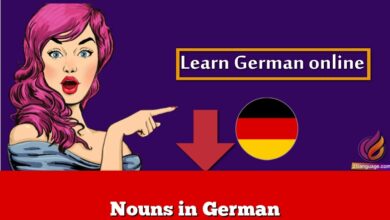Nationality in German

Nationality in German, and it’s very important.
There are many nationalities, too many to go over in this lesson, but you will learn more nationality as this level and book goes on. Right now we are just going to have a vague little list, and as this section goes on there will be more. Finally, gentlemen, get ready to have your minds blown…
This is the small list, make sure you memorize this list and the next one.
| English |
German |
| German(s) | (masculine) der Deutsche, (m. plural) die Deutschen; (feminine) die Deutsche, (f. plural) die Deutschen |
| American(s) | der Amerikaner, die Amerikaner; die Amerikanerin, die Amerikanerinnen |
| Englishman | der Engländer, die Engländer; die Engländerin, die Engländerinnen |
| Spaniard(s) | der Spanier, die Spanier; die Spanierin, die Spanierinnen |
| Italian(s) | der Italiener, die Italiener; die Italienerin, die Italienerinnen |
| Frenchman | der Franzose, die Franzosen; die Französin, die Französinnen |
Describing People with Nationality
It is no surprise you can describe people with nationality, most times, it’s stereotypical, like Norwegians are blonde, tall, etc. or Germans wear lederhosen, drink beer, and play polka all day long, but that is just not true. However you can just use it for what it is, a nationality. If you do describe people by nationality this will help. Okay, you should
already know how to describe, right?
This part we will get more in to detail later, but right it is an important part of describing people with nationality, even though in English we most times don’t do this, in German they do.
The difference between nationality and language, like in English, French and French. But in German it is französisch and Franzose, Französin.
This also is how it works for nationality describing by noun or adjective, which we are going to learn right now.
Noun or Adjective Nationality
There are two ways to describe someone. With a noun-based nationality word or an adjective-based nationality word.
But note that in German the noun-based form is used more often.
Example: Ich bin Schwede (I am Swedish) and Ich bin schwedisch (I am Swedish)
Example: Ich bin Franzose (I am French) and Ich bin französisch (I am French)
More Nationalities
| African (m.) | Afrikaner (-); (f.) Afrikanerin (-nen) |
| Albanian | Albaner (-); Albanerin (-nen) |
| Austrian | Österreicher (-); Österreicherin (-nen) |
| Czech | Tscheche (-n); Tschechin (-nen) |
| Chinese | Chinese (-n); Chinesin (-nen) |
| Dane | Däne (-n); Dänin (-nen) |
| Dutchman/woman | Holländer (-); Holländerin (-nen) |
| Estonian | Este (-n); Estin (-nen) |
| Finnish | Finne (-n); Finnin (-nen) |
| Greek | Grieche (-n); Griechin (-nen) |
| Hungarian |
Ungar (-n); Ungarin (nen) |
| Irish | Ire (-n); Irin (-nen) |





























